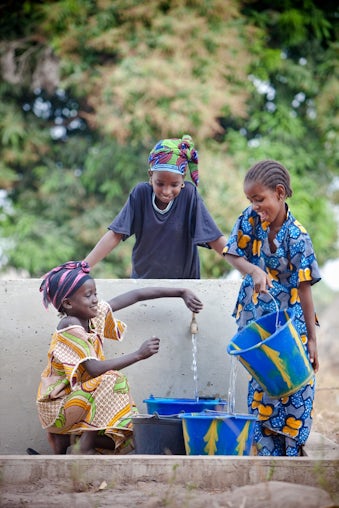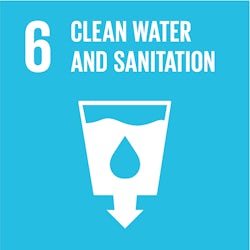Made Blue clean drinking water projects
In 2015, Interfood Holding signed a long-term commitment with MADE
BLUE foundation. Since then, many projects concerning clean drinking
water in countries such as Senegal and Ethiopia have been realized.
Did you know that 2.7 billion people globally have limited access to
drinking water? And over 600 million people globally lack clean
drinking water permanently? As a consequence, 3,5 million people die
every year and hygiene levels are low, with major implications for
health, education, income and environment.
These are challenges we think must be addressed to realize our vision
of a world in which everyone can enjoy food responsibly. Our
sustainable society pillar, part of our sustainability strategy,
targets these kind of challenges and presents our contribution to
local communities. Since 2015, an annual budget has been dedicated to
providing continuous support to Made Blue. The availability of clean
drinking water is essential both for health and hygiene purposes, but
also to liquify milk powder and thereby ensure access to the
nutrition provided by milk. Over the years, our partnership with Made
Blue has allowed for great impact in various African communities.
Kédougou and Salamate in Senegal
At the start of the partnership Interfood decided to sponsor an annual amount of money that is equal to the water needed to dissolve our annual product volumes in Western Africa, starting with Kédougou and Salamate in Senegal.
In December 2017,
this project has been finalized, although donations continue, and the
results of this project are very impressive.
- Two villages (including two schools) are connected to the new water network in the Kedougou region. The water supply consists of: boreholes, water towers, distribution pipes solar-powered pumps and several taps in the villages.
- As a result, almost 3,000 people have access to clean drinking water: 1,373 people in Ibel village and 1,549 people in Afia Dandémayo village.
- In addition, 526 students have access to clean drinking water at school.
- A management committee was appointed and trained for each village. These committees are responsible for maintaining the water supply systems.
- In addition, the local population has received training & information on the importance of clean water, hygiene linked to their health, and the environment. water, hygiene linked to their health.



Dembiya, Ethiopia
As of 2020, we partnered with MADE BLUE to set our sights on Dembiya in Ethiopia. The project in Dembiya involved drilling and developing a deep well, a water storage system to generate water pressure and a network of public tapping points. We are pleased that the water system is still functioning well and that all tapping points – in the community, school and hospital – are still being used satisfactorily. There have been some challenges in the field of maintenance, but fortunately these have been resolved. Solar panels have now been installed instead of the temporary generator!
WASH at Schools, in regions Addis Abeba and Oromia in Ethiopia
The project WASH at Schools is not only about clean drinking water,
but also about safe sanitation and good hygiene, especially in and
around schools. The project reaches 35,100 people, but specifically
also 15,300 girls in 20 schools. By building safe toilets, washbasins
and changing rooms, the project aims to decrease the absence rate of
girls from school by 50% in the next 2,5 years. The program focuses
on building water kiosks at schools and during school hours, the
kiosk provides safe and hygienic sanitary facilities.
The facilities
are managed by local micro-entrepreneurs and are also open to
community members: toilet and shower use and the sale of sanitary
items for a small fee. The proceeds are used to maintain and expand
local facilities and to guarantee a permanent income for the facility
managers.
The approach:
- We are renovating existing WASH facilities at ten schools, such as toilets and washbasins. In addition, we will build safe changing rooms for girls. We are building new facilities at 10 other schools.
- In addition, we will develop environmentally friendly menstrual waste processing facilities. We will also urge governments and manufacturers to lower the price of these products. This makes products such as sanitary towels and tampons available to large groups of girls and women.
- We build water points and safe toilets near schools so that people in the immediate vicinity of a school also have access to clean water and good sanitation.
- We are going to encourage young people and women to set up small businesses around the sale of clean water and the sale and production of menstrual products.
- And finally, we will provide training on clean water, good hygiene and good menstrual hygiene, including to local government officials, teachers and health care providers.


Our partnership for the coming years
At this moment, Interfood and MADE BLUE are investigating the best
way forward for our partnership and Interfood’s donations. What
kind of projects are in the pipeline? What kind of projects do we
want to support? What kind of deliverables can we agree on? And where
can we make the most impact? One thing is for sure, Interfood will
continue supporting MADE BLUE in their mission: clean drinking water
for everyone!
We will keep you
posted.
Together for better.

United Nations Sustainable Development Goals
There are several SDGs linked to the projects with MADE BLUE. Below is a brief overview.





More insights
You may also be interested in one of the following pages:


